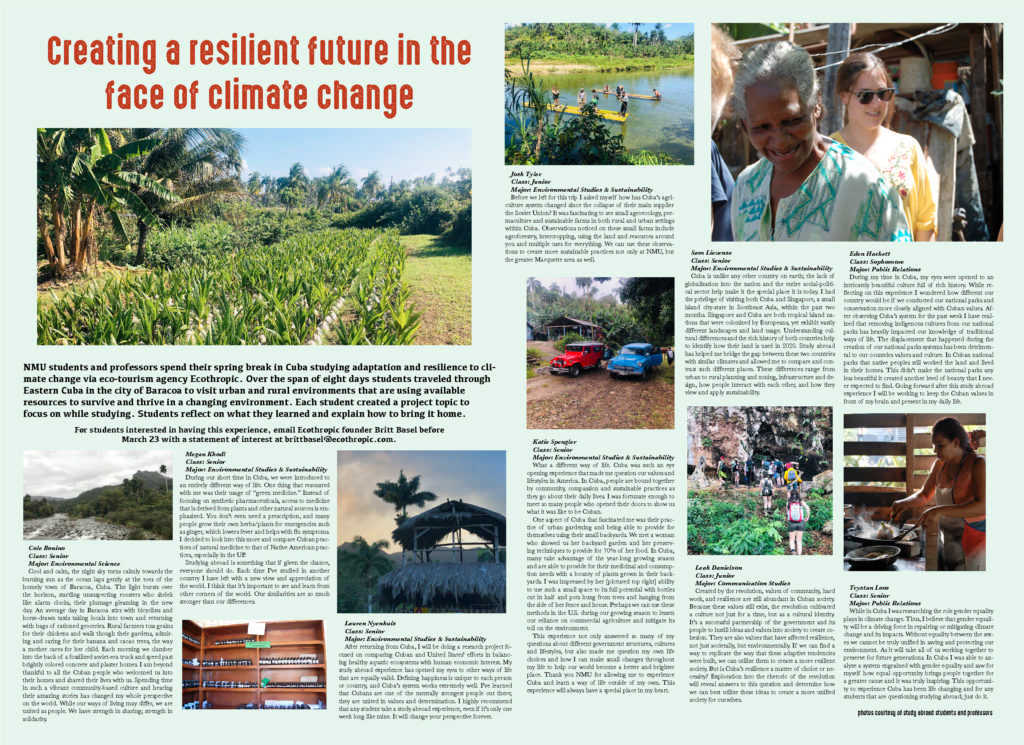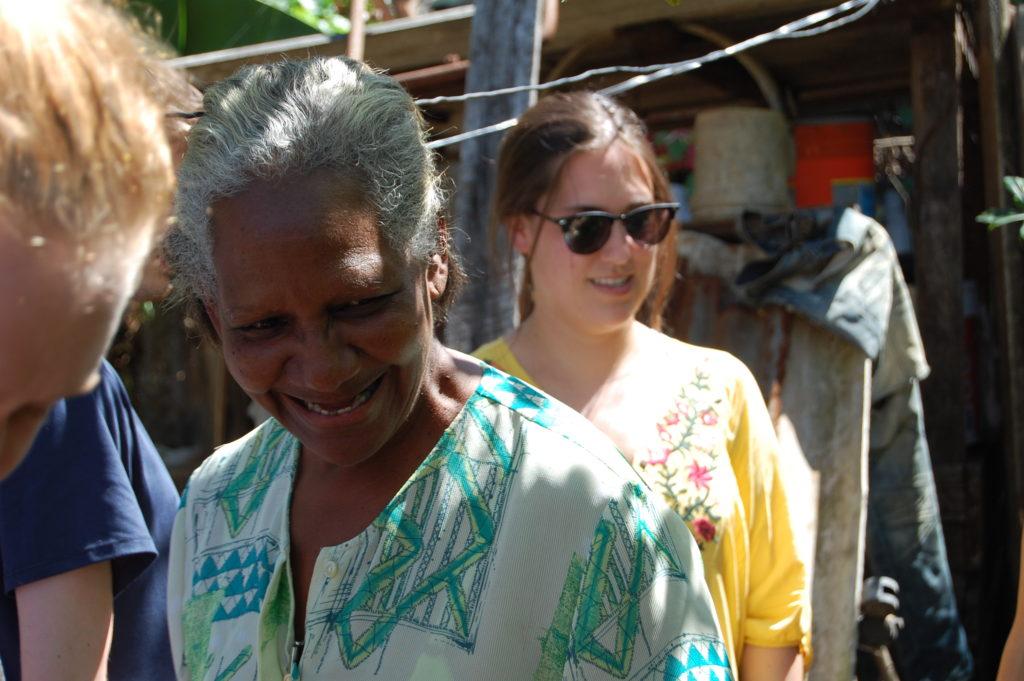
NMU students and professors spend their spring break focusing on Cuban adaptation and resilience to climate change with Ecothropic, an organization that brings community members and students together to plan for sustainable solutions. Over the span of eight days students traveled through Eastern Cuba in the city of Baracoa to visit urban and rural environments that are using the resources available to survive in a changing environment. Each student created a project topic to focus on while studying abroad. Students reflect on what they learned and explain how to bring it home.
For students interested in having a similar experience, email Ecothropic founder Britt Basel with a statement of interest at [email protected].
Megan Khodl, senior environmental studies & sustainability major
“During our short time in Cuba, we were introduced to an entirely different way of life. One thing that resonated with me was their usage of “green medicine.” Instead of focusing on synthetic pharmaceuticals, access to medicine that is derived from plants and other natural sources is emphasized. You don’t even need a prescription, and many people grow their own herbs/plants for emergencies such as ginger, which lowers fever and helps with flu symptoms. I decided to look into this more and compare Cuban practices of natural medicine to that of Native American practices, especially in the UP.
Studying abroad is something that if given the chance, everyone should do. Each time I’ve studied in another country I have left with a new view and appreciation of the world. I think that it’s important to see and learn from other corners of the world. Our similarities are so much stronger than our differences.”
Cole Bonino, senior environmental science major
“Cool and calm, the night sky turns calmly towards the burning sun as the ocean laps gently at the toes of the homely town of Baracoa, Cuba. The light bursts over the horizon, startling unsuspecting roosters who shriek like alarm clocks, their plumage gleaming in the new day. An average day in Baracoa stirs with bicyclists and horse-drawn taxis taking locals into town and returning with bags of rationed groceries. Rural farmers toss grains for their chickens and walk through their gardens, admiring and caring for their banana and cacao trees, the way a mother cares for her child. Each morning we clamber into the back of a fossilized soviet-era truck and speed past brightly colored concrete and plaster homes. I am beyond thankful to all the Cuban people who welcomed us into their homes and shared their lives with us. Spending time in such a vibrant community-based culture and hearing their amazing stories has changed my whole perspective on the world. While our ways of living may differ, we are united as people. We have strength in sharing; strength in solidarity.”
Lauren Nyenhuis, senior environmental studies & sustainability major
“After returning from Cuba, I will be doing a research project focused on comparing Cuban and United States’ efforts in balancing healthy aquatic ecosystems with human economic interest. My study abroad experience has opened my eyes to other ways of life that are equally valid. Defining happiness is unique to each person or country, and Cuba’s system works extremely well. I’ve learned that Cubans are one of the mentally strongest people out there; they are united in values and determination. I highly recommend that any student take a study abroad experience, even if it’s only one week long like mine. It will change your perspective forever.”
Sam Lievense, senior environmental studies & sustainability major
“Cuba is unlike any other country on earth; the lack of globalization into the nation and the entire social-political sector help make it the special place it is today. I had the privilege of visiting both Cuba and Singapore, a small island city-state in Southeast Asia, within the past two months. Singapore and Cuba are both tropical island nations that were colonized by Europeans, yet exhibit vastly different landscapes and land usage. Understanding cultural differences and the rich history of both countries help to identify how their land is used in 2020. Study abroad has helped me bridge the gap between these two countries with similar climates and allowed me to compare and contrast such different places. These differences range from urban to rural planning and zoning, infrastructure and design, how people interact with each other, and how they view and apply sustainability.”
Eden Hackett, sophomore public relations major
“During my time in Cuba, my eyes were opened to an intricately beautiful culture full of rich history. While reflecting on this experience I wondered how different our country would be if we conducted our national parks and conservation more closely aligned with Cuban values. After observing Cuba’s system for the past week I have realized that removing indigenous cultures from our national parks has heavily impacted our knowledge of traditional ways of life. The displacement that happened during the creation of our national parks systems has been detrimental to our countries values and culture. In Cuban national parks that native peoples still worked the land and lived in their homes. This didn’t make the national parks any less beautiful it created another level of beauty that I never expected to find. Going forward after this study abroad experience I will be working to keep the Cuban values in front of my brain and present in my daily life.”
Josh Tyler, junior environmental studies & sustainability major
“Before we left for this trip I asked myself how has Cuba’s agriculture system changed since the collapse of their main supplier the Soviet Union? It was fascinating to see small Agroecology, permaculture and sustainable farms in both rural and urban settings within Cuba. Observations noticed on these small farms include agroforestry, intercropping, using the land and resources around you, and multiple uses for everything. We can use these observations to create more sustainable practices not only at NMU, but the greater Marquette area as well.”
Katie Spengler, senior environmental studies & sustainability major
“What a different way of life! Cuba was such an eye opening experience that made me question our values and lifestyles in America. In Cuba, people are bound together by community, compassion, and sustainable practices as they go about their daily lives. I was fortunate enough to meet so many people who opened their doors to show us what it was like to be Cuban.
One aspect of Cuba that fascinated me was their practice of urban gardening and being able to provide for themselves using their small backyards. We met a woman who showed us her backyard garden and her preserving techniques to provide for 70% of her food. In Cuba, many take advantage of the year-long growing season and are able to provide for their medicinal and consumption needs with a bounty of plants grown right in their own backyards. I was impressed by her ability to use such a small space to its full potential with bottles cut in half and pots hung from trees and hanging from the side of her fence and house. Perhaps we can use these methods in the US during our growing season to lessen our reliance on commercial agriculture and mitigate its toll on the environment.
All in all, this experience not only answered so many of my questions about different government structures, cultures and lifestyles, but also made me question my own life choices and how I can make small changes throughout my life to help our world become a better and brighter place. Thank you NMU for allowing me to experience Cuba and learn a way of life outside of my own. This experience will always have a special place in my heart.”
Trystan Loos, senior public relations major
“While in Cuba I was researching the role gender equality plays in climate change. Thus, I believe that gender equality will be a driving force in repairing or mitigating climate change and its impacts. Without equality between the sexes we cannot be truly unified in saving and protecting our environment. As it will take all of us working together to preserve for future generations. In Cuba I was able to analyze a system engrained with gender equality and saw for myself how equal opportunity brings people together for a greater cause and it was truly inspiring. This opportunity to experience Cuba has been life changing and for any students that are questioning studying abroad; just do it.”
Leah Danielson, junior communication studies major
“Created by the revolution, values of community, hard work, and resilience are still abundant in Cuban society. Because these values still exist, the revolution cultivated a culture not just for a time, but as a cultural identity. It’s a successful partnership of the government and its people to instill ideas and values into society to create cohesion. They are also values that have affected resilience, not just societally, but environmentally. If we can find a way to replicate the way that these adaptive tendencies were built, we can utilize them to create a more resilient society. But is Cuba’s resilience a matter of choice or necessity? Exploration into the rhetoric of the revolution will reveal answers to this question and determine how we can best utilize these ideas to create a more unified society for ourselves.”




























